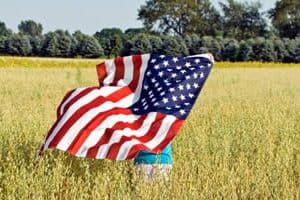Americans say they buy country property for many reasons—investment, recreation, business, relaxation, second home and retirement.
Is there more to it than that? Are we also driven by a deeper motive—a need from our evolutionary past?
Some anthropologists believe that property — house, stuff, retirement accounts, things we create — is an extension of our primal instinct to possess territory.
Many animals, particularly those with social organization, claim territory, which provides food, shelter, security, the idea of “home” and, finally, a sense of order about who belongs where that reduces conflict. Some mammals — but not all — define and defend territory, usually from others of the same species. As you might expect, this has to do with boys fighting over girls.
Territoriality also explains my nightly battle over how much blanket I get and how much my wife, Melissa, gets using her crocodile death roll.
Humans mark territory with visual cues like signs and fences. Hippos, lions and wolves use smell, the details of which are presented regularly on television nature documentaries and certain sitcoms. We deal with trespass with law; others use teeth. Both systems work.
If the human need for territory goes back to the African savannah, why is the idea that any Tom, Dick and Hairy could own land and enjoy property-based rights less than 300 years old?
The answer seems to be that for most of human history land in most civilizations was considered royal property, and ownership was concentrated in a relatively few hands. Land being the source of wealth in agricultural societies, those who controlled it had little interest in spreading ownership around. Law backed by absolute authority trumped evolutionary biology. This went on until authority was forced to become less absolute, and law became more democratic.
During the last three centuries, the individual’s urge to own land ramped up in society after society. It drove settlement in the continental U.S., and, eventually, helped to end collectivized agriculture in Russia and China.
The Declaration of Independence is a demand for territoriality. The 13 colonies asserted a “natural right” to be free of British law and royal authority.
Thomas Jefferson found this “natural right” in the writings of John Locke and others, but the human need for territory — the right to it, so to speak — went farther back in Nature than the Founders ever imagined.
Jefferson owned property of all kinds, which gave him his territoriality. The rebel Founders, all men of property, were speaking as much from their biology and their defense of their own territoriality as from their grievances over taxes on tea and stamps.
The truly remarkable insight that the American revolutionaries had was not in rebelling against authority — which had been a constant in human affairs — but in setting up a political system that allowed land ownership and property rights to be distributed widely, eventually. At the start, ownership rights were limited to men like themselves, but the ideas that framed their new political system were sufficiently elastic to stretch over those who had been backed out of the original deal.
American government adapted to new demands for property protection, rights and ownership—all of which express territoriality. The result was a system whose stability was based in its flexibility, a system stable enough to recover from the Civil War, the Great Depression, even Woodstock.
When property ownership is widespread, political systems around the world tend toward stability, the ability to get through crises and a broadening of individual rights. If the current economic collapse is allowed to reverse the distribution of ownership and societies revert to tenancy and foreclosed homelessness, many individuals will lose their sense of territoriality gained. Societies will pay for that.
When hippos, wolves and lions find their need to establish territory blocked, they fight amongst themselves, continuously.
Despite all the woe that predatory lending, sub-prime mortgages and foreclosures have inflicted on millions during the last 18 months, most of us still want to own a home…or two.
That want, that human drive to possess territory in the form of property, is, I think, based in both an evolutionary imperative and commonsense economics. While property carries the burden of upkeep, taxes and mortgage, we understand that it builds wealth over time when bought properly. This economic analysis is simply an extension of our early evolutionary wiring, which found survival benefits in having territory of one’s own.
More is at risk today than families losing their homes.
I agree that doing too little is more dangerous than doing too much.
The one-year-only $8,000 tax credit for first-time buyers of a principal residence excludes lots and second homes. It’s not much of an incentive, and its cap on income for potential users is too low. I fear this pump is too small.
The Administration’s $75 billion Homeowner Stability Initiative announced last month will help some refinance and modify loans. An estimated seven to nine million homeowners might be helped. Lenders are not required to modify loans; cash incentives are provided for them to do so.
Unlike Mr. Limbaugh, I hope these efforts work. I see no societal benefit in nine million foreclosures.
Real-estate brokers are having a hard time selling properties using traditional methods. Maybe a refocused appeal to our ancestral need for territory — for safety, security, sustenance, shelter (and sex, for reproduction only, of course) — might open a new selling path.
Territoriality is about owners posting comprehensive information for others to process. Hippos disclose fully, and so do lions and wolves.
Might property sales improve if sellers were to follow suit?
This content may not be used or reproduced in any manner whatsoever, in part or in whole, without written permission of LANDTHINK. Use of this content without permission is a violation of federal copyright law. The articles, posts, comments, opinions and information provided by LANDTHINK are for informational and research purposes only and DOES NOT substitute or coincide with the advice of an attorney, accountant, real estate broker or any other licensed real estate professional. LANDTHINK strongly advises visitors and readers to seek their own professional guidance and advice related to buying, investing in or selling real estate.







Curtis, I’ve enjoyed reading your columns, but I think you are way out in this one. I do not support socialism and evolution. I believe in Capitalism, not bailing out people who won’t take responsibility for their actions. Why should others pay for their greed? How does this square with the Constitution? I believe in God, the Creator. I think perhaps people want things from coveteousness (sin nature), not evolution. Dave